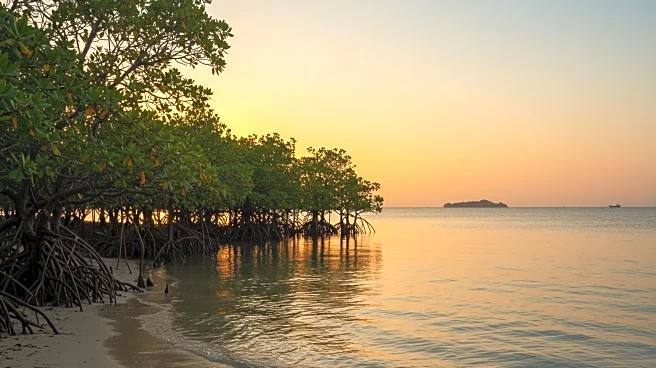What's Happening?
Coastal communities across the United States are intensifying efforts to restore natural barriers such as marshes, dunes, and reefs to combat the effects of rising sea levels and stronger storm surges. These initiatives are crucial as climate change continues to threaten coastlines, pushing saltwater further inland and endangering ecosystems and communities. Projects are underway in various states, including California, New York, New Jersey, and Alabama, focusing on rebuilding natural features that provide protection against erosion and flooding. The urgency of these efforts has been highlighted by recent developments, such as the cancellation of Louisiana's $3 billion Mid-Barataria project due to objections from the fishing industry and rising costs. Despite this setback, other restoration projects continue, aiming to enhance coastal resilience and protect vulnerable areas.
Why It's Important?
The restoration of coastal ecosystems is vital for mitigating the impacts of climate change, which poses significant risks to hundreds of communities and millions of people. By enhancing natural defenses, these projects aim to reduce the vulnerability of coastal areas to destructive storms and rising sea levels. This is particularly crucial for regions like the Gulf Coast, which have historically suffered from severe land loss and storm damage. The efforts not only protect human settlements but also preserve wildlife habitats and cultural heritage. As climate change intensifies, the success of these projects could serve as a model for other regions facing similar challenges, highlighting the importance of sustainable environmental management.
What's Next?
Future steps involve continuing the restoration of marshes, barrier islands, and other natural features, alongside the construction of flood walls and levees where necessary. Stakeholders, including government agencies and environmental organizations, are expected to collaborate on expanding these initiatives. The focus will be on integrating scientific research and community input to develop comprehensive coastal protection plans. Additionally, there may be increased advocacy for policy changes to support funding and implementation of restoration projects, ensuring long-term resilience against climate-related threats.
Beyond the Headlines
The restoration efforts also raise ethical and cultural considerations, as they involve balancing environmental protection with economic interests, such as those of the fishing industry. Moreover, these projects highlight the need for community engagement and education to foster a collective understanding of the importance of preserving natural ecosystems. Long-term, these initiatives could lead to shifts in public policy and societal attitudes towards environmental conservation, emphasizing the interconnectedness of human and ecological well-being.









